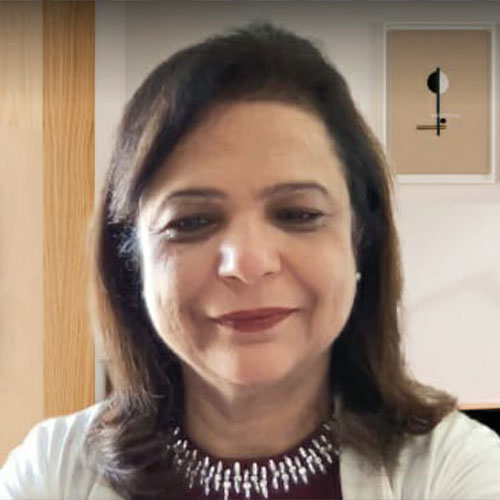
Sonia Arora
Ms. Sonia Arora is a Senior Program Coordinator at Bhavan Vidyalaya, a senior high school in Panchkula, India. She joined the institution in 1997 and has herself has been a travel leader escorting the school groups to USA, Europe, Japan in the last few years. She is now organizing a trip to the United Kingdom in June 2024 for the students and is also working for the trip to Singapore in January 2025 for the educators, demonstrating her commitment to professional development and global networking within the educational community.
Why are you passionate about student travel?
I recognise student travel as a powerful educational tool, which inspire students, broaden their horizons, and nurture a generation of culturally aware and globally minded individuals. I am passionate about student travel for several compelling reasons:
Personal Growth: I strongly believe, travel challenges students, fostering independence, resilience, and adaptability. They learn to navigate unfamiliar environments and solve problems creatively, all of which are valuable life skills.
Global Awareness: Students gain insights into global issues, promoting responsibility as global citizens. Traveling helps students to understand global issues firsthand, such as environmental challenges, socio-economic disparities and cultural exchanges.
Building Relationships: I have observed student travel encourages collaboration and teamwork among peers. Sharing travel experiences fosters strong bonds and friendships, promoting a positive classroom environment and enhancing social skills.
Inspiring Career Paths: Travel experiences spark interests and shape future career choices. For instance, visiting NASA has been incredibly inspiring experience for students interested in science, technology, engineering, and mathematics (STEM) fields.
Promoting Open-Mindedness: Students learn to appreciate and respect diverse perspectives, contributing to a more inclusive and harmonious society. Students experiencing different cultures firsthand fosters open-mindedness and tolerance.
What is a major highlight from any of your student travel experiences?
One of the most unforgettable and educational experience has been a visit to NASA
in 2011. Being present at the Kennedy Space Center in Florida was an incredibly enriching experience. The interactive exhibits and simulations allowed us to experience aspects of space travel firsthand. This included virtual reality experiences, astronaut training simulations, and educational games. Educational programs and workshops that included lectures, hands-on activities, and workshops focused on specific topics related to space science and engineering fostered a deeper appreciation for the wonders of space exploration and science. The major highlight of this travel experience was access to the restricted areas of NASA’s Kennedy Space Center to see operational facilities for the history and future of American spaceflight.
The KSC Explore Tour went beyond the Kennedy Space Center Bus Tour, making several stops to capture once-in-a-lifetime photo opportunities. Able to get a photographic view of numerous spaceflight icons like the Vehicle Assembly Building and NASA Press Site, disembarking to capture photos along the way to the Apollo/Saturn V Center. To add to this, the interactive session with the Astronaut Roger Crouch over the Lunch who shared his experiences and insights into space exploration. And thereafter, the group photo session with him left a profound impression on me and my students.
Overall, the NASA visit was a transformative experience that deepened my appreciation for space science and technology. It not only enhanced mine and the students understanding of aerospace concepts but also fueled the curiosity to explore further in the field of space exploration.
How do you try to tie your travel experiences back into the classroom?
Here are some strategies, I have been trying and adopting to tie travel experiences back into the classroom:
Reflection and Journaling: The students are encouraged and asked to keep travel journals or blogs during their trips. This could include documenting observations, cultural experiences, and personal reflections. When they return, students share excerpts from their journals with the class and discuss how their experiences relate to classroom topics.
Photo or Video Presentations: The students are asked to create presentations using photos or videos from their travels. They highlight interesting cultural aspects, historical sites, or geographical features they encountered. These presentations serve as multimedia tools to enhance classroom discussions.
Research Projects: Different groups are assigned research projects that require students to delve deeper into aspects of the destinations they visited. For example, students could research the history, art, literature, food, languages of the places they traveled to and then present their findings to the class.
Language and Communication: The students are asked to teach basic phrases or words they have learned from the visited places during their travels to their classmates, hence promoting global language learning into classroom activities.
From the Nominator:
What qualities make this nominee deserving of this award?
Her efforts have included organizing a variety of educational excursions, ranging from single-day trips for preschoolers to overnight journeys to various heritage sites across India. These excursions undoubtedly contribute to students’ holistic development by allowing them to explore and appreciate the rich cultural heritage of their country firsthand. Her good communication skills and ability to communicate clearly with students, locals, and other travelers—whether it’s to give directions, facilitate discussions or resolve conflicts—makes the travel experience smoother and more enjoyable for everyone involved. Overall, her skills contribute significantly to the success and positivity of any travel experience.
